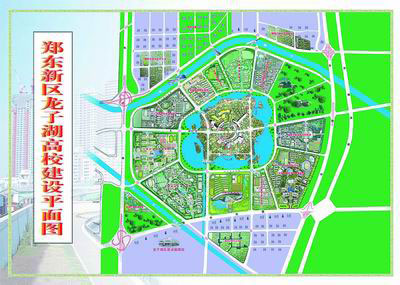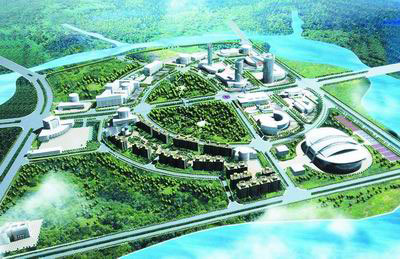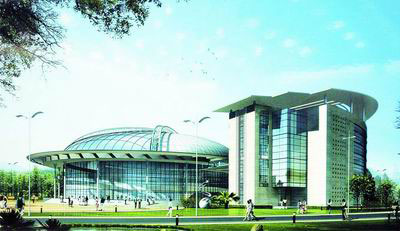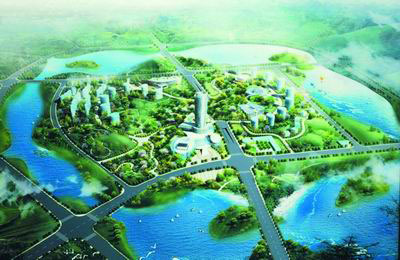The Zhengzhou University Town
In China, Henan province is the largest province in terms of population and the fifth largest province in terms of GDP (Gross Domestic Product). Yet its capital city Zhengzhou is ranked outside of the top twenty cities in China in both population and area size. The only way Zhengzhou was going to rise in the rankings is through some monumental public project by incorporation and urbanization of surrounding areas. Since Zhengzhou was not going to get the Olympics or the World Expo, the decision was to establish an eastern Zhengzhou area which includes a university town.. Here are the plans for the Longzihu University Town as drawn by a consortium from Australia, United Kingdom, Hong Kong, Jilin and Henan (via far2000 on December 4, 2005). This campus will accommodate more than a dozen different universities. Impressive, eh?




In order to realize this grand vision, it is necessary to mobilize the resources such as construction funds and, most importantly, making the land available. The nature of this project is that publicity is important and the scale of the project is such that it cannot be hidden. As it turns out, this project went against central government edicts about unapproved large public works and, specifically, against illegal land expropriation.
(People's Daily) Local officials disciplined over land use. September 28, 2006.
The State Council yesterday disciplined two senior government officials of Central China's Henan Province for illegally authorizing the use of land.
In a meeting presided over by Premier Wen Jiabao yesterday, the State Council decided to circulate a notice of criticism to the Henan provincial government, and ordered it to submit a self-criticism for its dereliction in carrying out the national land policy.
Li Xinmin, a member of the Henan Provincial Standing Committee of the Communist Party, and Wang Wenchao, Party secretary of Zhengzhou, capital of Henan, were given severe disciplinary penalties.
The Zhengzhou municipal government and related departments illegally expropriated 14,877 mu (1,860 hectares) of land for the construction of an education park in the city's Longzihu District from 2003 to 2006, Xinhua News Agency reported.
Despite an order from the Ministry of Land and Resources in 2005 to redress its actions, the Zhengzhou municipal government expanded the project, the report said. "This is a large case that severely violated the overall land use plan and illegally granted approval for huge land expropriation," said the report.
The Henan provincial government failed to carry out the national policy to rectify the land market order and failed to keep a tight control on land supply, it said. "Related leaders either explicitly instructed or acquiesced to illegal land expropriation," it said.
The State Council stressed that officials of all levels should draw a lesson from the illegal land expropriation case. "Facing the severe situation of a sharp decrease of arable land and an ever-increasing population, one must bear in mind a strong sense of suffering and danger," the report said.
The State Council ordered strengthened supervision and established a reporting system for officials to curb rampant land expropriation. The criticism came shortly after the State Council released a circulation to strengthen land management earlier this month. The criticism is considered a warning for local officials not to illegally expropriate land in a reckless pursuit of investment.
(CCTV via ChineseNewsNet) The investigation of the land grab in Zhengzhou: The Longzihu University District is now wasteland. October 12, 2006.
[in translation]
Right how, there is basically no sign of construction activity in the Longzihu University town. At some of the work sites, the reporter observed only stacks of construction material lying in a waste land. The reeds have grown to waist-high. ... The entire Longzihu University campus was supposed to be more than 16 square kilometers in area with at least 12 universities and 150,000 students and staff.
The reporter noted that between March 2003 and February 2005, the stated area of the Longzihu University campus was about 6,000 mu's. Yet when the National Land Resources Department investigation team uncovered the problem, the area of the campus grew since February 2005 to 14,877 mu's for an increase of almost 9,000 mu's. This was obviously an attempt to expand the scope of the project and forced the hand of the central government with a fait accompli.
According to the original plan, there would be the artificial lake known as Longzihu (Lake of the Son of the Dragon) around which the universities would be scattered. But the reporter did not see any lake. According to the people at the construction command center, construction activities had basically stopped after the June inspection by the National Land Resources Department. Besides the lake itself, construction at five of the university campuses (including the Henan Commerce Professional Training Insititute and the Henan Police Professoinal Training Institute) had stopped even though the land had been leveled already.
The preceding is just background information for the real story. Suppose you are a university president and your university was going to be open this year on the Longzihu campus. You had issued letters of admission and you have an existing student body. You expect to accommodate more than 5,000 students at your new Longzihu campus. What will you do now? Will you tell the admitted students that there will not be a campus? Since it will be too late for the students to apply to other schools, they have basically lost one year of their lives. What will 5,000 students if they show up and find no dormitories and no classrooms? The answer is simple ... read on ...
(Southern Weekend) The Whole Story of the Zhengzhou Longzihu University Town. By Chai Huiqun (柴会群). October 19, 2006.
[in translation]
Wang Aiqun said that he has aged about 10 years in the last six months. This 53-year-old white-haired Henan Provincial Technical Profssional Training School president said that he had been worried about the newly constructed eastern campus.
Actually, electricity was first turned on only three days before the official opening of the campus. The cafeteria was first opened on the first evening. The school still has no bathing halls, no bank and even the outer campus walls are not finished yet.
Construction began in February and the campus was opened in October. Wang Aijun worked at an astonishing pace to complete the construction of a new university campus -- against orders!
This was against orders because Wang Aiqun received orders from the local government to cease construction. At the time, the Longzihu university town was being investigated by the National Land Resources Department. Wang Aiqun's building had just finished construction of its top floor. Going against orders happened to be the feature of the entire illegal land expropriation case in Longzihu.
Wang just ignored those orders and made the construction team work day and night. He had to make the school ready before school starts. So when October 4 came for school start, more than 5,000 students moved in. Before that, Wang was really worried about disturbances among the students if construction was not finished on time.
Under the recent policies to rapidly expand student enrollment, the school enrollment had jumped sharply from the 3,000 students in 2001 to the current 13,500. The original campus is now seriously "overloaded." That original campus technically no longer belongs to the school and will be demolished because it is situated inside Zhengzhou city proper.
On September 27, the State Council handled the Longzihu illegal land expropriation case in a stern manner. The disciplined officials were at the most senior level since the National Land Resources Department was founded eight years ago. Wang Aiqun's Henan Provincial Technical Professional Training School was one of the 13 universities in the area. But in the land expropriation case, the university leaders such as Wang Aiqun were not disciplined.
Longzihu is a university town built upon farm lands and fish ponds. It occupies more than 14,000 mu's of land. Astonishingly, the project had not been reported to the National Land Resources Department. All the land expropriations were approved by the Henan provincial and Zhengzhou city governments -- even though they do not have the authority to approve!
According to a Henan-based National Land Resources Department official, the project had not been reported for a good reason -- they knew that if they reported it, it will surely not be approved. If it were not for the fact that the peasants continued to petition the central government and the National Land Resources Department studied satellite photographs of the site, this university town project might be successfully completed.
If completed, the usual deals can be made -- all the missing applications will be filed later for an already complete project. It is worthwhile to note that 6,400 mu's of the land were classified as basic farm land. According to the national regulations, if even one mu's of basic farm land is used for construction, it must be approved by the State Council.
The reality is that in February 2005, National Land Resources Department supervisory department director Zhang Xinhao and his team were in Zhengzhou to investigate the matter. At the time, six universities were already in Longzihu. After the Henan provincial government submitted its investigative report, the State Council agreed that the six would be allowed to stay provided that there would be more construction for the rest. At the time, the fact was that most of the principal buildings of the six universities had been completed and they were already recruiting students. Therefore, it was no longer viable to revert the land back to farming. Demolishing the buildings would only create more economic losses and problems. So that was the best solution.
Yet what happened next was a large-scale land expropriation with seven more university campuses located on the new land.
According to Wang Aiqun, the Henan provincial Technical Professional Training School was supposed to the first to enter the Longzihu campus and it had adequate capital. But construction was delayed due to issues of compensations to the peasant owners and therefore he had to disobey orders to complete the project.